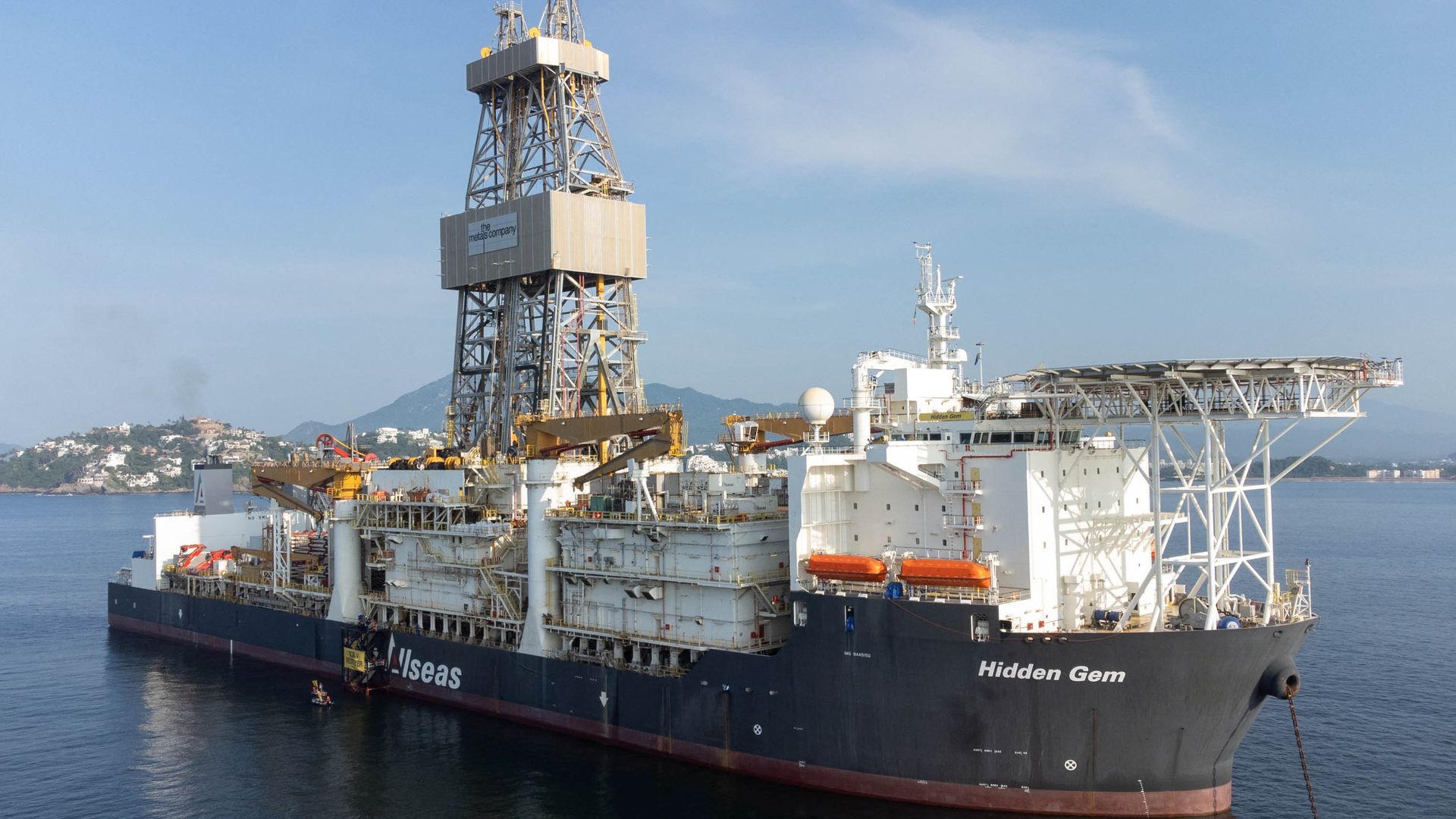
IT’S A RACE TO THE BOTTOM WITH OCEAN FLOOR AS THE FINISH LINE.
NATIONS ACROSS THE GLOBE ARE EYEING DEEP SEA MINING AS A WAY TO BOOST PRODUCTION OF CLEAN ENERGY TECHNOLOGY.
BUT WITH THE RUSH FOR RESOURCES – THE POTENTIAL HARM TO THE ENVIRONMENT IS STILL UNCLEAR.
THE CRUCIAL MATERIAL – COVERS VAST AREAS OF THE SEABED – AND IS WORTH TRILLIONS.
SMALL ROCKS KNOWN AS POLYMETALLIC NODULES CONTAIN A VARIETY OF RARE EARTH METALS LIKE COBALT, NICKEL, COPPER, AND EVEN SMALL AMOUNTS OF LITHIUM.
MINING EXECUTIVES CALL IT A ‘BATTERY IN A ROCK’ – THAT’S BECAUSE THESE RESOURCES ARE CRUCIAL FOR ELECTRIC VEHICLE PRODUCTION.
THEY ESTIMATE THE AMOUNT FOUND IN JUST A FRACTION OF THE PACIFIC OCEAN’S SEAFLOOR COULD POWER ABOUT TWO-HUNDRED-AND-EIGHTY-MILLION E-VS, NEARLY equivalent TO THE TOTAL NUMBER OF *ALL CARS IN THE U.S.
AND WHILE PROSPECTORS HAVE ALSO PROMOTED DEEP SEA MINING AS A MORE ETHICAL FORM OF MINERAL EXTRACTION, CONCERNS REMAIN ABOUT HOW CLEAN THE PROCESS OF OBTAINING THESE RARE EARTHS WILL BE AND WHO WILL BENEFIT MOST FROM IT.
CHINA CURRENTLY HOLDS FIVE OF THE THIRTY EXPLORATION LICENSES THAT THE INTERNATIONAL SEABED AUTHORITY HAS ISSUED TO DATE, THE MOST OF ANY COUNTRY, GIVING THEM EXCLUSIVE RIGHTS TO EXCAVATE AN AREA OF OCEAN FLOOR ABOUT THE SIZE OF THE UNITED KINGDOM.
NINETY-FIVE-PERCENT OF THE WORLDWIDE SUPPLY IS ALREADY CONTROLLED BY CHINA, WITH THE NATION ALSO PRODUCING THREE-QUARTERS OF ALL THE WORLD’S LITHIUM-ION BATTERIES.
EXPERTS WORRY THAT IF CHINA CAN BE BECOME A DOMINANT PLAYER IN SEABED MINING, THEN BEIJING COULD CONTROL A VAST SUPPLY OF MANY KEY MINERALS NEEDED FOR EMERGING INDUSTRIES.
AND CHINA IS NOT THE ONLY NATION WITH A KEEN INTEREST IN MINING THE OCEAN FLOOR. COUNTRIES LIKE NORWAY AND JAPAN ARE LOOKING AT THEIR OWN COASTAL RESOURCES, FURTHER INCREASING THE SCALE OF THIS POTENTIALLY HARMFUL PRACTICE.
SOME ENVIRONMENTALISTS BELIEVE DEEP SEA MINING WILL DISRUPT THE WORLD’S LARGEST NATURAL CARBON SINK, RESPONSIBLE FOR ABSORBING ONE THIRD OF ALL CARBON DIOXIDE GENERATED ON LAND.
THE MINING PLATFORMS, MACHINERY AND SHIPS NEEDED FOR THESE PROJECTS WILL ALSO ADD TO NOISE AND POLLUTION THAT CAN HARM MARINE LIFE.
ADDITIONALLY, THE PROCESS OF EXCAVATING THE SEA FLOOR COULD CAUSE HARM TO A VARIETY OF AQUATIC ECOSYSTEMS.
THESE ARE ISSUES THE INTERNATIONAL SEABED AUTHORITY WILL HAVE TO CONTEND WITH AS ITS COUNCIL CONTINUES DRAFTING RULES FOR DEEP SEA MINING.











